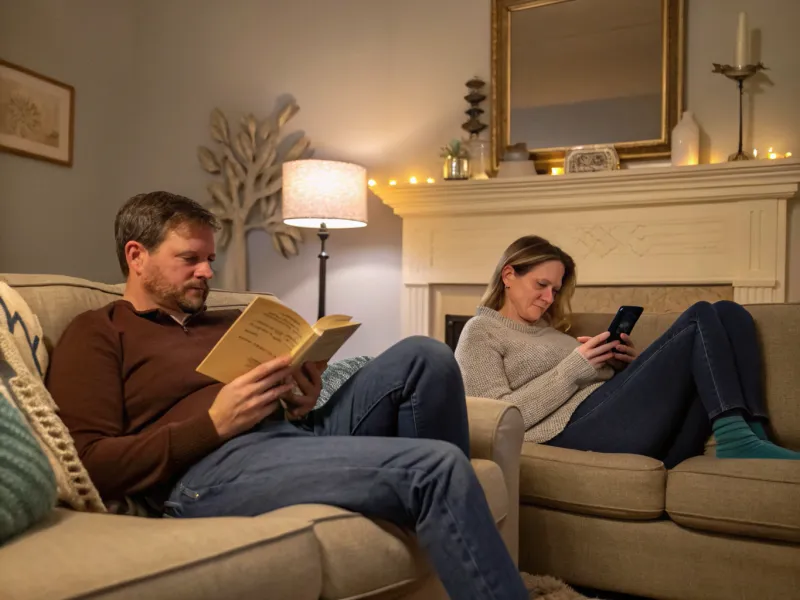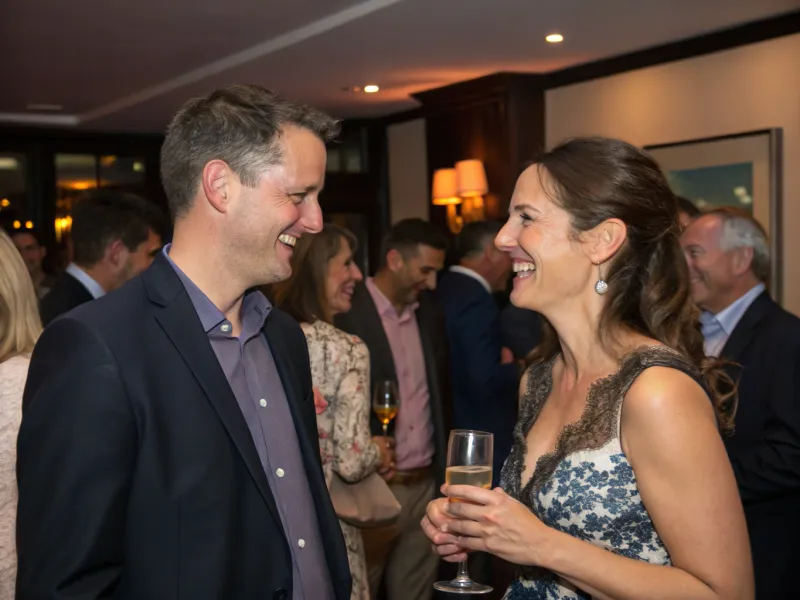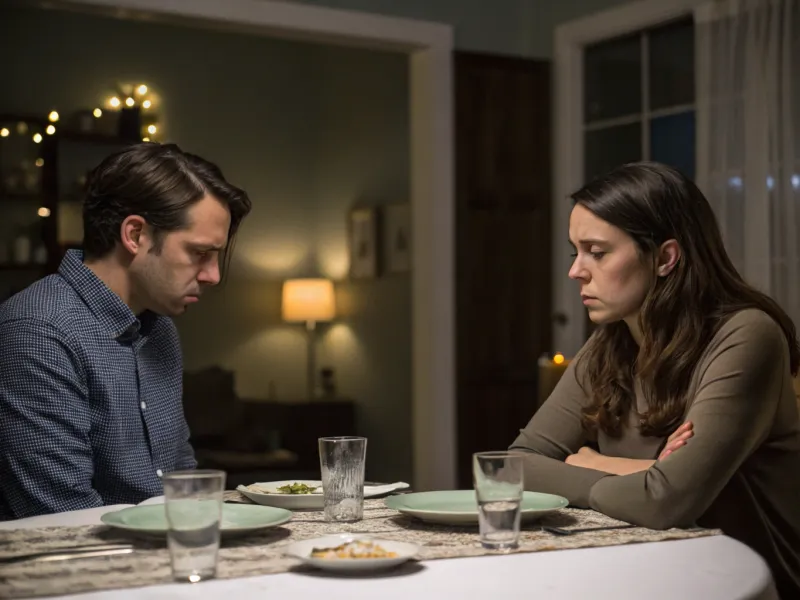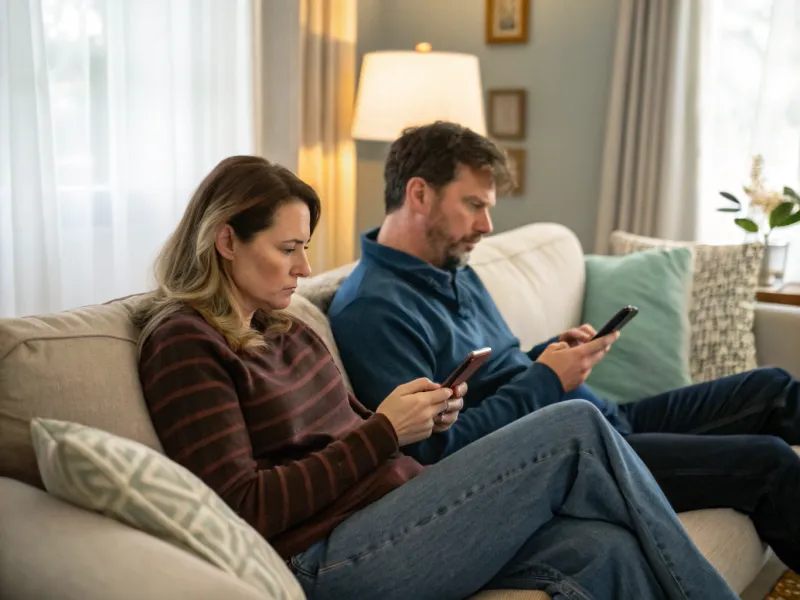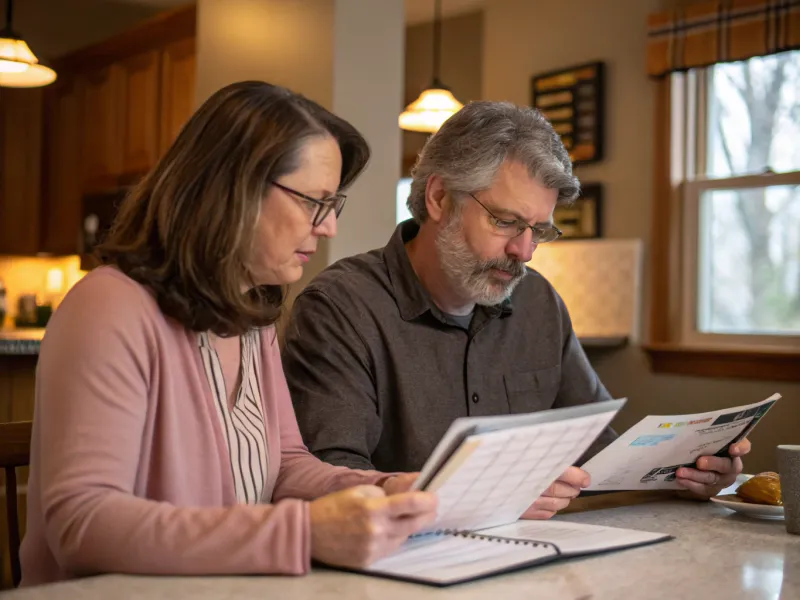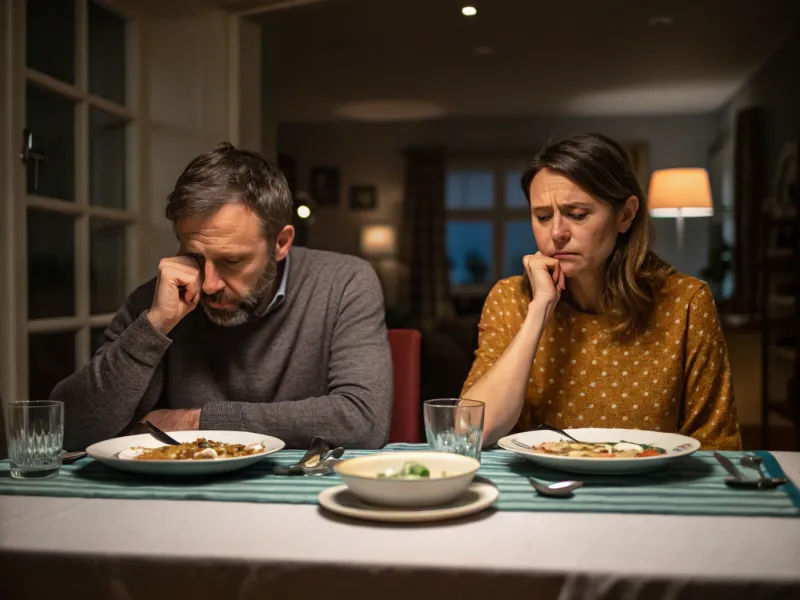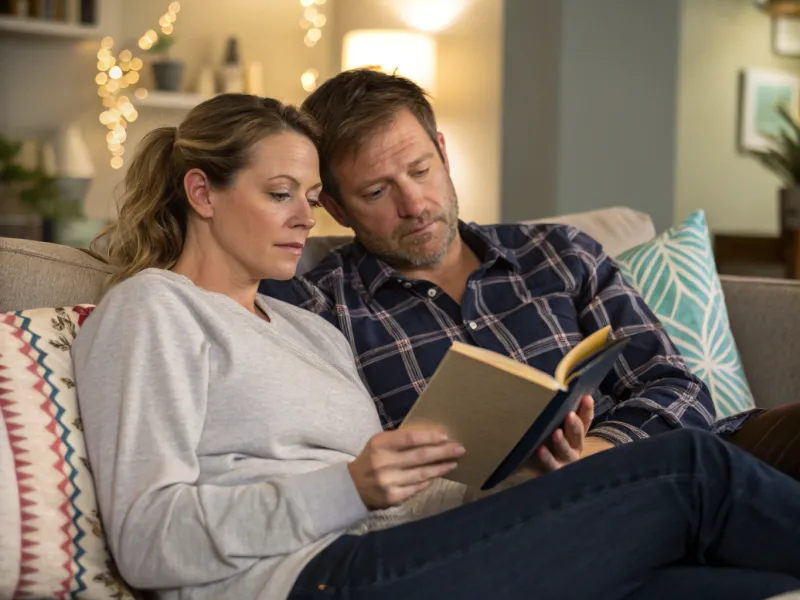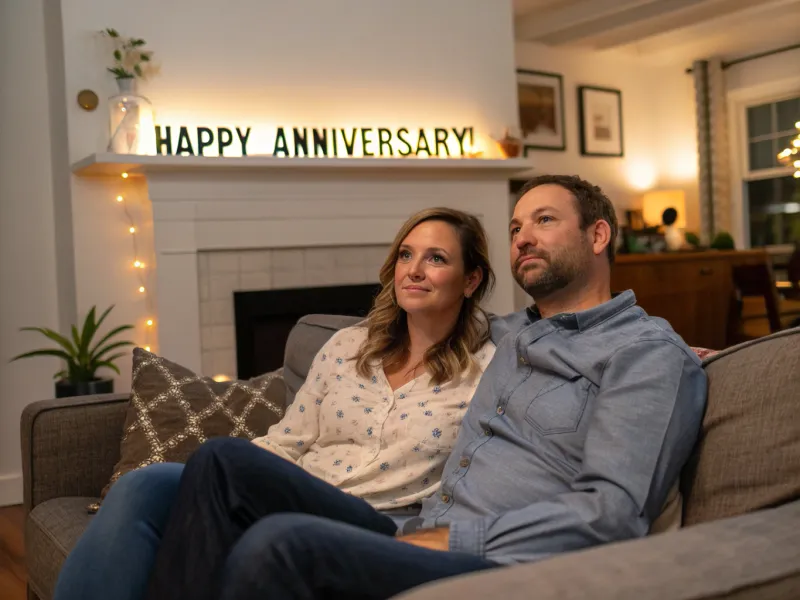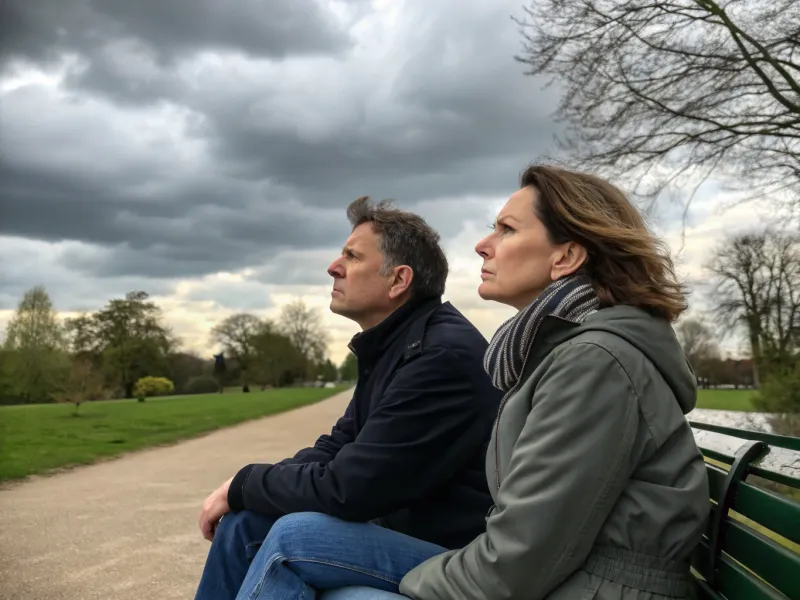You wake up each morning feeling a chill in the air, not from the drafty window left ajar, but from the emptiness that has settled between you and the one you once called your soulmate.
It’s a subtle, creeping sensation like a shadow casting its pall over what used to be bright and warm. As you move through the motions of daily life, you begin to wonder if your marriage has quietly drifted into the realm of coexistence, devoid of the affection and passion it once held.
Questi segnali vi aiuteranno a capire a che punto è il vostro matrimonio, quindi non perdiamo altro tempo e andiamo al sodo!
1. Pasti silenziosi
L'ora di cena, un tempo piena di risate e storie, ora risuona di silenzio. Siete entrambi seduti a tavola, gli utensili tintinnano contro i piatti, ma le parole sono poche e distanti tra loro. La televisione è spesso l'unico suono che rompe la quiete, una distrazione dall'assenza di conversazione.
Avete iniziato a notare che il silenzio è più confortante del tentativo di trovare qualcosa da dire. È diventata un'abitudine prendere il telefono o guardare la TV, evitando il contatto visivo e, soprattutto, evitando argomenti più profondi che potrebbero accendere un conflitto o richiedere un coinvolgimento emotivo.
Nei primi tempi, i pasti erano un'occasione per riallacciare i rapporti, condividere i sogni e pianificare le avventure. Ora sembrano solo un altro compito da portare a termine prima di ritirarsi in angoli separati della casa. La riluttanza a impegnarsi è un segno evidente che quella che una volta era una partnership ora è un semplice accordo.
2. Mancanza di affetto fisico
Ricordate il calore di un abbraccio spontaneo o la rassicurazione di tenersi per mano mentre si guarda un film? Questi gesti sono diventati rari, quasi estinti. Il tocco che una volta diceva "ti amo" ora sembra meccanico, se mai avviene.
L'intimità che univa le vostre vite sembra essersi sciolta, lasciando un senso di isolamento anche quando siete fisicamente vicini. Potreste stare a letto, con un abisso di lenzuola vuote tra di voi, fingendo di dormire per evitare di parlare del motivo per cui l'intimità è sparita.
L'affetto fisico è più di una semplice abitudine: è un linguaggio d'amore e di connessione. La sua assenza la dice lunga sulla distanza emotiva che si è insinuata, trasformando il calore in freddezza e la vicinanza in solitudine.
3. Evitare la compagnia reciproca
Una volta i fine settimana venivano trascorsi esplorando nuovi luoghi o semplicemente godendo della compagnia reciproca. Ora, invece, si trovano scuse per stare lontani. Che si tratti di immergersi nel lavoro, negli hobby o persino di fare commissioni, si nota uno sforzo per ritagliarsi uno spazio personale.
It’s not just about needing time alone, which is healthy in any relationship, but an underlying desire to escape the discomfort of togetherness. You realize that being in the same room has become heavy, laden with unspoken grievances or unmet expectations.
Questo evitamento è un'ammissione silenziosa del fatto che il matrimonio non sembra più un'unione. È come se foste due passeggeri della stessa nave, che navigano verso destinazioni diverse, intrappolati in una corrente che nessuno di voi sembra disposto a navigare insieme.
4. Indifferenza costante
L'indifferenza è furtiva, non esplode con le discussioni ma si insinua con un sussurro. Potreste notarla nel modo in cui smettete di chiedere della giornata dell'altro o nel modo in cui siete diventati indifferenti ai suoi successi o alle sue difficoltà.
The little things that once mattered—asking about their meeting, celebrating small victories—are now met with a shrug or a dismissive nod. The emotional energy that used to fuel those interactions is depleted, replaced by a sense of detachment.
Questa indifferenza può essere più dannosa della rabbia; è un segno che l'investimento emotivo nella relazione è diminuito. Quando si smette di interessarsi alle esperienze, alle gioie e alle difficoltà dell'altra persona, ciò indica una significativa erosione del legame che un tempo vi univa.
5. Nessun interesse condiviso
Un tempo gli interessi comuni costituivano un ponte tra i vostri mondi, un terreno comune in cui entrambi vi sentivate connessi e visti. Ma ora quegli interessi sono svaniti, lasciando dietro di sé un abisso che nessuno dei due sembra desideroso di attraversare.
Potreste scoprire che le attività che un tempo vi piacevano insieme ora vi sembrano degli obblighi. La gioia di scoprire cose nuove insieme è stata sostituita dallo sforzo di mantenere un'apparenza di unità, anche quando manca l'entusiasmo genuino.
La mancanza di interessi comuni è più di un cambiamento di hobby: è un sintomo di una deriva emotiva più profonda. Significa un allontanamento dalle esperienze condivise che un tempo vi avvicinavano, evidenziando il crescente divario tra le vostre vite e i vostri cuori.
6. Circoli sociali separati
I vostri circoli sociali hanno cominciato ad allontanarsi, proprio come voi due. Un tempo vi piaceva condividere gli incontri, incontrare amici comuni e socializzare in coppia. Ora, invece, vi sentite a vostro agio in ambienti separati, preferendo impegnarvi con gli amici individualmente piuttosto che insieme.
Questa separazione non riguarda solo l'espansione dei propri orizzonti sociali, ma riflette la mancanza di desiderio di presentare un fronte unito. È più facile affrontare le situazioni sociali da soli piuttosto che affrontare l'imbarazzo di fingere che tutto vada bene davanti agli altri.
Quando le vostre vite sociali non si intersecano più, diventa una metafora della divisione personale. Segnala che la relazione potrebbe essere passata da un viaggio condiviso a percorsi paralleli, in cui ognuno di voi cammina a fianco dell'altro ma non insieme.
7. Mancanza di supporto emotivo
There was a time when you could lean on each other, feel each other’s pain, and be the anchor in turbulent times. Now, when you reach out for support, you find emptiness instead of solace.
Le vostre difficoltà, per quanto significative o minori, sembrano passare inosservate. Al posto del conforto e della comprensione, c'è un modello di disinteresse. Vi rendete conto che il vostro partner non è più il vostro confidente, ma semplicemente un convivente.
Il sostegno emotivo è fondamentale per la salute di qualsiasi relazione. La sua assenza è un chiaro indicatore che il tessuto emotivo del vostro matrimonio si è logorato, facendovi sentire isolati e non curati.
8. Diminuzione del rispetto
Una volta il rispetto era la pietra angolare della vostra relazione, un riconoscimento reciproco del valore e dei valori dell'altro. Con il passare del tempo, però, il rispetto si è eroso, sostituito da disinteresse o disprezzo.
Le discussioni che un tempo si concludevano con una comprensione, ora si trasformano in cicli di biasimo e frustrazione. Si tende a sminuire le opinioni dell'altro o a liquidare le preoccupazioni senza pensarci due volte. Le fondamenta del rispetto reciproco che mantenevano sani i disaccordi si sono incrinate.
Questa diminuzione del rispetto non è solo una serie di parole dure o di gesti sprezzanti, ma è il riflesso di una disillusione più profonda. Senza rispetto, la partnership diventa sbilanciata e ciascuno di voi si sente sottovalutato e non ascoltato.
9. La routine al posto del romanticismo
Un tempo, le sorprese e il romanticismo erano intessuti nel tessuto delle vostre giornate. Ora la routine e la prevedibilità hanno preso il loro posto, lasciando poco spazio alla spontaneità e all'affetto. Ogni giorno sembra una ripetizione, prevedibile e priva di ispirazione.
I piccoli gesti che un tempo vi facevano sentire speciali sono diminuiti, oscurati dalla monotonia della vita quotidiana. Cene romantiche, uscite spontanee o anche un semplice complimento sono diventati reliquie del passato.
La routine non è intrinsecamente negativa, ma quando mette in ombra il romanticismo, indica una perdita di passione. Questo cambiamento suggerisce che la relazione si è stabilizzata in uno schema prevedibile, perdendo la scintilla che un tempo la teneva viva.
10. Evitare i conflitti
Il conflitto, se gestito in modo costruttivo, può rafforzare i legami. Ma evitare del tutto il conflitto può implicare una riluttanza a impegnarsi a fondo. Potreste notare che i disaccordi vengono nascosti sotto il tappeto, le conversazioni girano intorno ad argomenti delicati e le questioni rimangono irrisolte.
Invece di discussioni appassionate o addirittura accese che portano a una crescita, c'è una tranquilla accettazione dei problemi così come sono. Questa mancanza di confronto non significa pace, ma una mancanza di impegno, una mancanza di volontà di lottare per la relazione.
L'evitamento del conflitto suggerisce un matrimonio in cui il legame è stato sostituito dalla compiacenza. Questa coesistenza passiva evidenzia un ritiro emotivo, in cui ci si sente più sicuri a evitare che ad affrontare e risolvere.
11. Segreto finanziario
In un matrimonio sano, la trasparenza finanziaria è un pilastro della fiducia. Ma quando la segretezza si insinua nei vostri rapporti finanziari, è un segnale di allarme per problemi più profondi.
Potreste notare estratti conto nascosti, acquisti non dichiarati o una certa riluttanza a discutere degli obiettivi finanziari. Questa segretezza crea una barriera, una divisione tra quelli che dovrebbero essere un fronte unito nella gestione delle risorse.
Il segreto finanziario non riguarda solo il denaro, ma anche la fiducia e la collaborazione. Rivela una spaccatura di fondo, suggerendo che il matrimonio potrebbe essere più un contratto che una collaborazione. È un sintomo di una partnership che si è trasformata in sopravvivenza individuale.
12. Imbroglio emotivo
L'intimità emotiva al di fuori del matrimonio può essere dannosa quanto l'infedeltà fisica. Potreste scoprire che voi stessi o il vostro partner cercate conforto o connessione da qualcun altro, condividendo pensieri e sentimenti che dovrebbero essere riservati al vostro coniuge.
Questo intreccio emotivo crea una rete di segretezza e tradimento, che distoglie l'energia e l'attenzione dal vostro matrimonio. È un tradimento della fiducia emotiva, che crea uno spazio in cui il vostro partner non si sente più il vostro confidente, ma piuttosto solo un'altra persona nella vostra vita.
Il tradimento emotivo evidenzia un vuoto emotivo significativo nel matrimonio, un vuoto che è stato colmato da qualcun altro. Sottolinea la disconnessione emotiva e la ricerca di appagamento al di fuori del legame coniugale.
13. Disinteresse per i piani futuri
Un tempo pianificare il futuro era un'impresa entusiasmante, piena di sogni e aspirazioni. Oggi, invece, le discussioni sul futuro vengono accolte con indifferenza o evitate.
Che si tratti di pianificare una vacanza, di acquistare una casa o anche di discutere della pensione, si nota una mancanza di entusiasmo. È come se il futuro fosse un viaggio in solitaria piuttosto che un'avventura condivisa, con ognuno di voi che traccia percorsi separati.
Questo disinteresse per i progetti futuri la dice lunga sullo stato attuale della relazione. Quando la prospettiva diventa frammentata, riflette un allontanamento emotivo, in cui la visione di una vita condivisa diventa un ricordo lontano.
14. Mancanza di apprezzamento
Una volta l'apprezzamento fluiva in modo naturale, un semplice riconoscimento degli sforzi e dei contributi dell'altro. Ora, quelle parole di gratitudine sembrano essere svanite nel nulla.
Potreste notare che i gesti, grandi o piccoli, non vengono riconosciuti. L'impegno profuso nel mantenere la casa, nel sostenere gli obiettivi dell'altro o anche solo nell'essere presenti viene accolto con il silenzio invece che con i ringraziamenti.
Questo mancanza di apprezzamento is more than just missed words; it’s a sign of emotional neglect. It suggests that the relationship is no longer about mutual support and recognition, but about fulfilling roles without regard for the emotional exchange that once existed.
15. Isolamento dalla famiglia
Le riunioni di famiglia erano un tempo un momento di gioia e di connessione, ma ora sembrano un lavoro di routine. Potreste ritrovarvi a partecipare meno agli eventi familiari o a disimpegnarvi quando ci siete.
L'isolamento dalla famiglia non è solo un desiderio di indipendenza, ma riflette la rottura del sistema di sostegno che un tempo circondava il vostro matrimonio. Diventa più facile evitare che spiegare, ritirarsi piuttosto che impegnarsi e stabilire un legame.
Questo isolamento è un riconoscimento silenzioso della distanza emotiva all'interno del matrimonio. Significa il passaggio da un'unione solidale a un'esistenza solitaria, in cui i legami familiari non sembrano più un legame condiviso.
16. Confronto con gli altri
Il confronto è il ladro della gioia, ma è anche uno specchio che riflette ciò che manca nella vostra relazione. Potreste sorprendervi ad ammirare altre coppie, a desiderare le risate, il legame o l'intimità che sembrano condividere senza sforzo.
Questo confronto crea un senso di inadeguatezza, evidenziando ciò che manca alla vostra relazione. Non si tratta di semplice invidia, ma di un desiderio di appagamento emotivo che sembra assente nel vostro matrimonio.
L'atto di paragonare la propria relazione agli altri è un chiaro indicatore di insoddisfazione. Sottolinea il vuoto emotivo e il desiderio di ciò che è stato o che potrebbe essere, rivelando la fredda realtà di una relazione senza amore.
17. Mancanza di comunicazione
La comunicazione è il l'ancora di salvezza di ogni relazionema quando diminuisce, lascia dietro di sé un silenzio inquietante. Potreste notare che le conversazioni sono sommarie e si concentrano sulla logistica piuttosto che sulle emozioni o sui sogni.
Questa mancanza di comunicazione crea una barriera, un divario che cresce con ogni parola non detta. Lo scambio di idee e sentimenti, un tempo vivace, viene sostituito da scambi di routine, che vi fanno sentire estranei.
Il declino della comunicazione non è solo silenzio, ma è un ritiro dall'intimità. Significa una riluttanza a impegnarsi, una riluttanza a condividere e una distanza emotiva che trasforma il matrimonio in una semplice convivenza.
18. Ritiro dall'intimità
L'intimità è il cuore pulsante di un matrimonio appassionato, ma quando si affievolisce è un chiaro indicatore della distanza emotiva. Potreste scoprire che la vicinanza fisica è sostituita dalla routine, priva di passione o desiderio.
Il ritiro non riguarda solo gli atti fisici, ma anche la connessione emotiva che un tempo scatenava gioia e vicinanza. L'assenza di intimità lascia dietro di sé un vuoto, uno spazio dove un tempo prosperava l'amore.
Il ritiro dall'intimità riflette un disimpegno emotivo più profondo, un passaggio dal legame alla mera coesistenza. È un riconoscimento silenzioso del fatto che il matrimonio ha perso la sua scintilla, lasciando dietro di sé un accordo freddo.
19. Mancanza di obiettivi condivisi
Un tempo gli obiettivi condivisi costituivano una tabella di marcia per il vostro futuro, una visione che guidava il vostro viaggio insieme. Ma ora quegli obiettivi sono frammentati, e ognuno di voi sta tracciando percorsi separati.
C'è una disconnessione in ciò che un tempo vi univa, una divergenza nelle ambizioni e nei sogni. La mancanza di obiettivi condivisi indica un allontanamento dalla partnership, un passaggio a ricerche individuali piuttosto che ad aspirazioni collettive.
Questa mancanza di allineamento evidenzia la frattura emotiva, riflesso di una relazione che ha perso il suo scopo e la sua direzione. Sottolinea il passaggio da un viaggio condiviso a percorsi individuali che non si intersecano più.
20. Crescente risentimento
Resentment is a silent poison, a gradual accumulation of unresolved issues and unmet needs. You might notice it in the way small grievances turn into major arguments, or how past mistakes are drudged up repeatedly.
Questo crescente risentimento non riguarda solo i disaccordi, ma è una disillusione più profonda, un segno che le ferite emotive del vostro matrimonio sono state lasciate a marcire. Crea una barriera, un muro che cresce ad ogni conflitto non affrontato.
La presenza di risentimento indica un matrimonio in cui persistono questioni irrisolte, creando un abisso emotivo che trasforma l'amore in amarezza. È un segno che la relazione è diventata un campo di battaglia piuttosto che un rifugio.
21. Discussioni frequenti
I frequenti litigi possono essere un segno che il matrimonio è in crisi. Sebbene i disaccordi siano normali, un conflitto costante indica problemi irrisolti. Queste discussioni possono creare un ambiente tossico, rendendo difficile il fiorire dell'amore.
Capire le cause dei litigi può aiutare le coppie ad affrontarli in modo costruttivo. È fondamentale affrontare i disaccordi con empatia e disponibilità a trovare un terreno comune. Anche la pratica dell'ascolto attivo può stemperare le tensioni e favorire la comprensione.
Quando i litigi diventano troppo frequenti o intensi, è consigliabile cercare un aiuto professionale. Un terapeuta può offrire strategie per gestire i conflitti e ricostruire una relazione armoniosa.
22. Mancanza di supporto alla crescita personale
In un matrimonio fiorente, il sostegno alla crescita dell'altro è fondamentale. Ma quando questo sostegno viene meno, ci si sente soffocati o non riconosciuti.
Potreste notare una mancanza di incoraggiamento o di interesse per i risultati o le aspirazioni personali. L'entusiasmo che un tempo accompagnava i traguardi personali viene sostituito dall'indifferenza o addirittura dalla gelosia.
Questa mancanza di sostegno alla crescita personale riflette un cambiamento emotivo significativo. Fa pensare a un matrimonio che si è trasformato da partner che si nutrono a conviventi indifferenti, in cui il progresso individuale sembra un viaggio solitario.
23. Esaurimento emotivo
L'esaurimento emotivo è il culmine di problemi non affrontati e di bisogni emotivi non soddisfatti. Si manifesta come una stanchezza pervasiva, una stanchezza che si insinua in ogni interazione.
Potreste ritrovarvi prosciugati da semplici conversazioni, senza l'energia necessaria per impegnarvi o investire emotivamente nella relazione. Questo esaurimento crea una barriera, una riluttanza a connettersi o a confrontarsi con i problemi di fondo.
L'esaurimento emotivo indica un matrimonio in cui i bisogni emotivi non vengono soddisfatti, creando un ciclo di ritiro e disimpegno. Evidenzia la trasformazione da una partnership amorevole a un accordo emotivamente sterile.
24. Perdita di individualità
In un matrimonio sano si celebra l'individualità. Ma quando si affievolisce, potreste perdere di vista chi siete al di fuori della relazione.
This loss manifests as a merging of identities, where personal desires and goals are overshadowed by the demands of the marriage. It’s a subtle erosion of self, a gradual fading of what makes you unique.
La perdita dell'individualità indica una relazione che soffoca anziché sostenere. Riflette il passaggio dalla partnership a un accordo in cui la crescita e l'espressione personale sono sacrificate per il bene della coesistenza.
25. Sentirsi non amati
Sentirsi non amati è più di una mancanza di affetto; è un vuoto emotivo che permea ogni interazione. Potreste percepirlo nell'assenza di parole gentili, di gesti o persino di contatto visivo.
Questa sensazione non riguarda solo il contatto fisico, ma anche il legame emotivo che un tempo vi faceva sentire apprezzati e amati. La sua assenza crea un vuoto profondo, la consapevolezza che la relazione ha perso il suo calore.
Sentirsi non amati è un chiaro segno che il matrimonio è passato dall'amore a un accordo freddo. Sottolinea la distanza emotiva e il desiderio di legame che rimane insoddisfatto.
26. Celebrazioni trascurate
Un tempo le celebrazioni erano occasioni di gioia, che segnavano pietre miliari e traguardi. Oggi, invece, questi momenti passano inosservati, oscurati dalla banalità. L'eccitazione che un tempo accompagnava questi eventi viene sostituita dall'indifferenza o dalla dimenticanza.
Le celebrazioni trascurate riflettono un distacco emotivo più profondo. Significa il passaggio da una relazione piena di gioia e riconoscimento a una in cui anche i momenti speciali si perdono nella routine di un accordo senza amore.
27. Problemi irrisolti del passato
Il passato racchiude ricordi cari e dolorosi, ma quando i problemi del passato rimangono irrisolti, diventano un peso.
You might find old arguments resurfacing, and past mistakes haunting your present interactions. These unresolved issues create a cycle of blame and frustration, hindering emotional growth.
Le questioni irrisolte del passato sono un chiaro indicatore di stagnazione emotiva. Evidenziano un matrimonio intrappolato in un ciclo di conflitti, in cui il passato irrisolto mette in ombra il potenziale di un futuro amorevole.
28. Vivere in mondi separati
Vivere insieme ma sentirsi distanti è una consapevolezza che ci tormenta. Potreste notare un crescente distacco, con ciascuno di voi che vive vite parallele piuttosto che un'esistenza condivisa.
Questa separazione non è solo una distanza fisica, ma un abisso emotivo che si allarga ogni giorno che passa. È come se non faceste più parte della stessa storia, ma piuttosto di due narrazioni che si muovono in direzioni diverse.
Vivere in mondi separati riflette un matrimonio che ha perso il suo nucleo di connessione. Rappresenta una transizione dall'unità all'isolamento, in cui il viaggio condiviso si è frammentato in percorsi solitari.
29. Forced Conversations
When every conversation feels like a chore, it’s a clear sign that connection has faded. You find yourself carefully choosing words, dodging emotional landmines, or talking just to fill the silence rather than truly engaging.
It’s no longer about sharing thoughts or emotions—it’s about surviving another exchange without conflict or discomfort. You might go through entire conversations on autopilot, smiling when necessary, but feeling emotionally checked out the entire time.
Forced conversations don’t build intimacy—they drain it. When dialogue becomes an obligation rather than a desire, it reflects a relationship that’s running on empty, where communication no longer comes from a place of love or curiosity.
30. Fantasizing About a Different Life
It starts subtly—daydreams about what life might be like if you were on your own or with someone who truly understands you. These fantasies aren’t about temporary escape; they begin to feel like hope for a better reality.
You find comfort in imagining a future where your needs are met and your heart feels full again. And while fantasy isn’t inherently harmful, when it becomes your emotional refuge, it’s a red flag that something in your real life is missing.
Longing for a different life reflects a deep dissatisfaction that’s gone unresolved. When your dreams feel more fulfilling than your reality, it’s a powerful sign that the love in your marriage has grown cold, and your spirit is searching for warmth elsewhere.
31. Lack of Shared Laughter
Laughter is often described as the best medicine, but what happens when it disappears from a marriage? Shared laughter can be a powerful bond, a glimpse into mutual joy. When a couple stops laughing together, it may signify an emotional disconnect.
Imagine a time when everything was funny and lighthearted. If those moments have vanished, it might be worth exploring the reasons why. Has the stress of daily life overshadowed joy?
Rediscovering humor can be vital in reigniting the spark. Consider sharing a favorite comedy or recalling a treasured memory filled with laughter.
32. Transactional Communication
Communication is the foundation of any relationship. But when it turns transactional, purely functional, it loses its soul. Imagine conversations reduced to grocery lists and schedules. Emotional depth fades, leaving behind a mere checklist.
Have you noticed conversations becoming mechanical and devoid of personal connection? This shift can erode intimacy, creating a chasm between partners.
Reintroducing heartfelt dialogue may require patience and creativity. Perhaps start with shared interests or explore new hobbies together. Nurturing conversations can transform a mechanical routine into a meaningful relationship.




